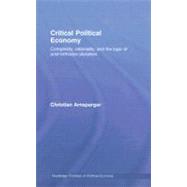
| Acknowledgements | p. xvi |
| Foreword | p. xviii |
| Introduction | p. 1 |
| Think again! | p. 1 |
| Economics in a liberating economy | p. 4 |
| The idea of Critical Political Economy | p. 6 |
| A self-undermining orthodoxy | p. 8 |
| The new aims of political economy | p. 10 |
| The mainstream use of economic models | p. 12 |
| Economic knowledge as a tool for action | p. 15 |
| Plan of the book | p. 17 |
| Uncritical complexity | p. 21 |
| Uncritical atoms: the limits of standard economics | p. 23 |
| Two basic questions | p. 24 |
| A tradition of social criticism | p. 26 |
| The anti-emancipatory inversion of standard economics | p. 31 |
| Homo economicus and reflexive social change: study of a constitutive impossibility | p. 39 |
| Looking for homo criticus | p. 54 |
| Uncritical mass: the limits of complexity economics | p. 56 |
| The bottom-up irrelevance of standard economics | p. 57 |
| Post-Walrasian approaches | p. 61 |
| The structure of complexity economics | p. 63 |
| The suicide of the critical subject | p. 74 |
| The use of uncritical knowledge in society | p. 82 |
| The Hayekian heritage of complexity economics | p. 82 |
| Theorist's ignorance, agents' ignorance | p. 84 |
| The competitive process as a real-time "theory" | p. 89 |
| Competition and "spontaneous consciousness" | p. 92 |
| From co-evolution to co-reflection | p. 96 |
| Bottom-up Critical Theory: the logic of self-criticizing complexity | p. 103 |
| The use of critical knowledge about society | p. 105 |
| Creating a potential for social emancipation | p. 105 |
| "Superstition" and the control of social forces | p. 113 |
| Critically oriented interaction and "conscious spontaneity" | p. 129 |
| The unavoidable necessity of critical rationality | p. 133 |
| Bottom-up Critical Theory: what does economics describe? | p. 139 |
| Toward a bottom-up Critical Theory | p. 139 |
| End-state versus process | p. 151 |
| "Critical descriptiveness": what does economics describe? | p. 154 |
| A self-criticizing economic system | p. 162 |
| Emancipation in complex systems | p. 164 |
| From "spontaneous consciousness" to "conscious spontaneity" | p. 174 |
| Toward a theory of self-criticizing systems | p. 181 |
| To what real economy do we aspire? | p. 193 |
| Toward a critical mainstream? | p. 195 |
| A formal approach to critically rational action | p. 197 |
| Why normative economics needs other foundations | p. 197 |
| The spread of critical ideas in complex economic systems | p. 201 |
| Can normative economics become emancipation-oriented? | p. 217 |
| Which characteristic emergents do we want? | p. 220 |
| Breaching the positivelnormative divide | p. 224 |
| Critical Political Economy: the logic of "post-orthodox" pluralism | p. 229 |
| The use of economics in a complex economy | p. 231 |
| The economist as participant observer | p. 231 |
| A self-criticizing economics in a self-criticizing economy | p. 235 |
| The individual use of economic theories | p. 239 |
| Path dependence, variety, and ignorance | p. 240 |
| Opportunistic consultants | p. 247 |
| The dynamics of theory diffusion and the Hayek-Fukuyama theorem | p. 249 |
| Critical consultants and the Horkheimer-Marcuse theorem | p. 251 |
| Free-economy economics | p. 256 |
| An economics that reflects on itself | p. 256 |
| Economics as an intrinsically political discipline | p. 258 |
| Another "Purple Rose of Cairo"? | p. 267 |
| Post-orthodox pluralism in economics | p. 275 |
| Economic theory and local knowledge | p. 275 |
| The thorny issue of "economic literacy" | p. 278 |
| Critical Political Economy: an ideal curriculum | p. 281 |
| Knowledge institutions in a genuinely liberating economy | p. 285 |
| Dominant paradigm or neutral language? | p. 288 |
| The most lucid way ahead | p. 289 |
| Taking the "CPE test" | p. 291 |
| Notes | p. 293 |
| Bibliography | p. 295 |
| Index | p. 306 |
| Table of Contents provided by Ingram. All Rights Reserved. |
The New copy of this book will include any supplemental materials advertised. Please check the title of the book to determine if it should include any access cards, study guides, lab manuals, CDs, etc.
The Used, Rental and eBook copies of this book are not guaranteed to include any supplemental materials. Typically, only the book itself is included. This is true even if the title states it includes any access cards, study guides, lab manuals, CDs, etc.